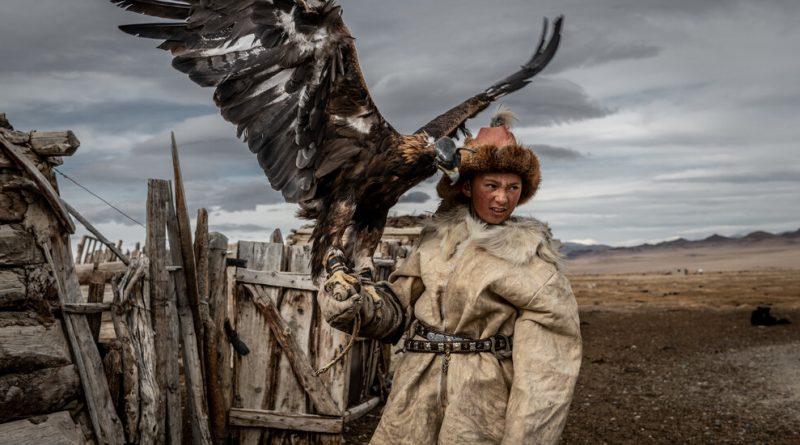On Horseback Among the Eagle Hunters and Herders of the Mongolian Altai
[ad_1]
Nine-year-old Dastan, the son of a Kazakh eagle hunter, rode his pony alongside mine, cantering effortlessly without a saddle and giggling at my attempts to show my fluffy pony some affection — a gesture that the animal wasn’t accustomed to.
Surrounding us was the vast, desolate landscape of the Altai Mountains of western Mongolia. From the grassy valley where horses grazed along the river, the rocky, gold-tinted terrain stretched endlessly toward the jagged ridges in the distance, with a dusting of snow heralding the arrival of winter.
On horseback with Dastan, I was reminded in some ways of my childhood in Wales, where I spent my days riding my pony through the countryside, enjoying the quiet natural beauty of my surroundings, always with a hot cup of tea waiting for me at the end of a long day.
In October 2019, after almost three years living and working in northern Iraq, where I covered the country’s efforts to defeat the Islamic State, I began working on a personal photography project that drew on my background and affinity with horses. My goal was to explore the relationships between animals — horses, in particular — and the people whose livelihoods depend on them.
To start, I flew to western Mongolia to meet and photograph the iconic Kazakh hunters, horsemen and animal herders.
With the help of a local guide and translator, I traveled from the town of Olgii, the capital of Bayan-Olgii province, to visit some of the seminomadic herding families who continue to live off the land in an extremely harsh environment.
Encompassing the westernmost area of Mongolia, Bayan-Olgii is the country’s only Muslim and Kazakh-majority province, or aimag.
Deep in the Altai Mountains, where Russia, China, Kazakhstan and Mongolia meet, Kazakh people have for centuries developed and nurtured a special bond with golden eagles, training the birds to hunt foxes and other small animals.
Alankush, an eagle hunter, animal herder and father of two, said that he looks after his eagle “as if she were a baby.”
The ancient custom of hunting with eagles on horseback is traditionally passed down from father to son at a young age and is considered a great source of pride.
“All Kazakhs love to train eagles,” said Alankush. “Now we keep eagles mostly because it’s a traditional sport.”
Serik Gingsbek, who was 26 when I met him, is a well-known and accomplished eagle hunter, sportsman and horse trainer. He talked at length with me about his special relationship with his eagle.
“If my eagle feels bad, I feel bad,” he said. “If she’s happy, I’m happy. When we go to the mountains, we share everything together.”
In recent generations, many Kazakh families have migrated from the countryside to urban areas, partly because of the difficulties in accessing health care, education, social services and employment opportunities. Among those who have stayed, the ancient practice of eagle hunting has provided an additional source of income from the visitors who pay to see the famed birds in action.
Training and caring for golden eagles is just one aspect of an animal herder’s life; others include training young horses, tending sheep, milking yaks and butchering meat.
The daily demands of a traditional herding family’s life can leave little time for additional education or the pursuit of personal ambitions away from home.
In response to their physically demanding lifestyles, parents who work as herders often send their children to boarding school in towns and cities, sometimes far from home, in the hope that their children will secure a more comfortable future.
Despite having lived his entire life in the mountains, Alankush said he hopes for a different path for his children. “I don’t have an education, and I’m not young,” he told me. “If I were young, maybe I’d go to Olgii to work — but for me it’s better to stay in the countryside.”
“Countryside life is very hard, especially for children,” he said. “That’s why I send my children to school. If they finish university, I hope they’ll find jobs in the city.”
Paradoxically, such parental ambitions may result in the eventual disappearance of a culture and way of life that has survived for generations.
Outwardly, documenting the traditional ways of life in western Mongolia stands in stark contrast to my time spent photographing scenes of conflict and suffering in Iraq. But the two subjects share a common theme: the human struggle not just to survive, but to build a better future for oneself and one’s family.
That universal struggle can be found in situations of conflict, occupation and forced emigration, just as it can be found in the circumstances of a nomadic people subsisting on what many would consider meager resources.
And despite the differences in the surroundings and the scope of the challenges faced by the people I met, I felt a connection — and shared a common language — with the Kazakh horsemen, through our mutual affinity with horses.
